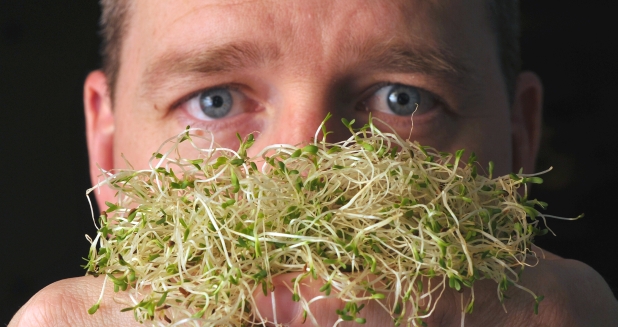Full-time hockey goon Kevin Allen (right, exactly as shown), who unfortunately lives in Vancouver and had to tolerate the indignity of the Boston Bruins stealing the Stanley Cup (that’s hockey) has decided to drown his misery by focusing on his real job and talking about the risks of raw sprouts.
He was even nice enough to mention me, although he had no trouble shooting pucks off my head, skating by, and going, uh, sorry.
Didn’t care, the equipment was better and you don’t score goals shooting off the goalie’s head.
 Although it can be unnerving.
Although it can be unnerving.
Sorta like the faith-based food safety system that has evolved around fresh produce, especially sprouts.
Randy Shore of the Vancouver Sun reports that a University of British Columbia.-led study of microorganisms on domestic produce found detectable levels of bacteria on 93 per cent of samples of sprouts taken from grocery stores across Canada.
Sprouts are grown in a warm, moist environment for three to five days, a perfect breeding ground for bacteria, said lead researcher Kevin Allen, a UBC food microbiologist, who likens the risk associated with eating commercially grown sprouts to consuming uncooked seafood.
Although the enterococcus bacteria detected on the sprouts poses no direct threat to health, the growing conditions that allow it to thrive can also encourage the growth of more harmful bacteria, such as E. coli and salmonella.
Nearly 80 per cent of sprout samples — including bean, alfalfa, broccoli, garlic and onion — showed microbial loads too numerous to count. Herbs, salad greens and spinach showed far fewer positive results and generally lower microbial loads.
Allen’s produce testing revealed that seven per cent of fresh herb samples and two per cent of sprout samples contained a generic non-deadly form of E. coli, while about half of all samples of herbs, spinach, sprouts and leafy greens contained detectable levels of coliform, which may indicate fecal contamination of soil or water.
The distribution and concentration of enterococcus in the sprouts was much higher than expected, Allen said. Samples of produce were collected from grocery stores in five Canadian cities, including Vancouver, in March.
Kansas State University food safety professor Doug Powell, a collaborator with Allen, has recorded 38 outbreaks of illness associated with the consumption of raw sprouts over the past 20 years.
“From a consumer’s perspective, if produce is contaminated when it comes into the household, there is almost nothing they can do short of cooking it that will reduce or eliminate that risk,” said Allen.
But a note from the old prof to the former student: publish before press release.
